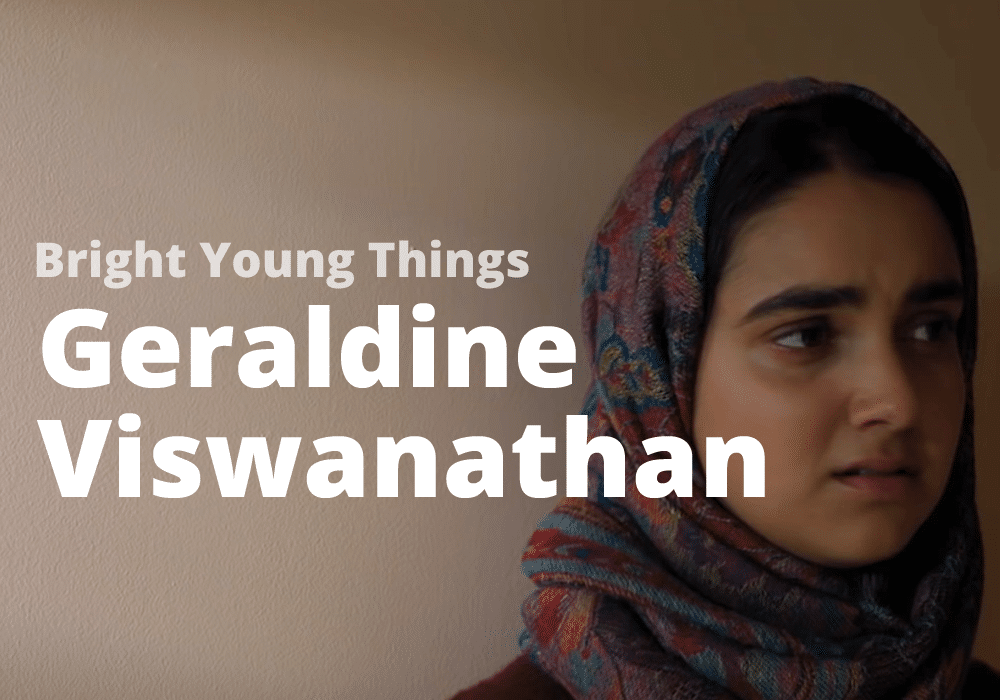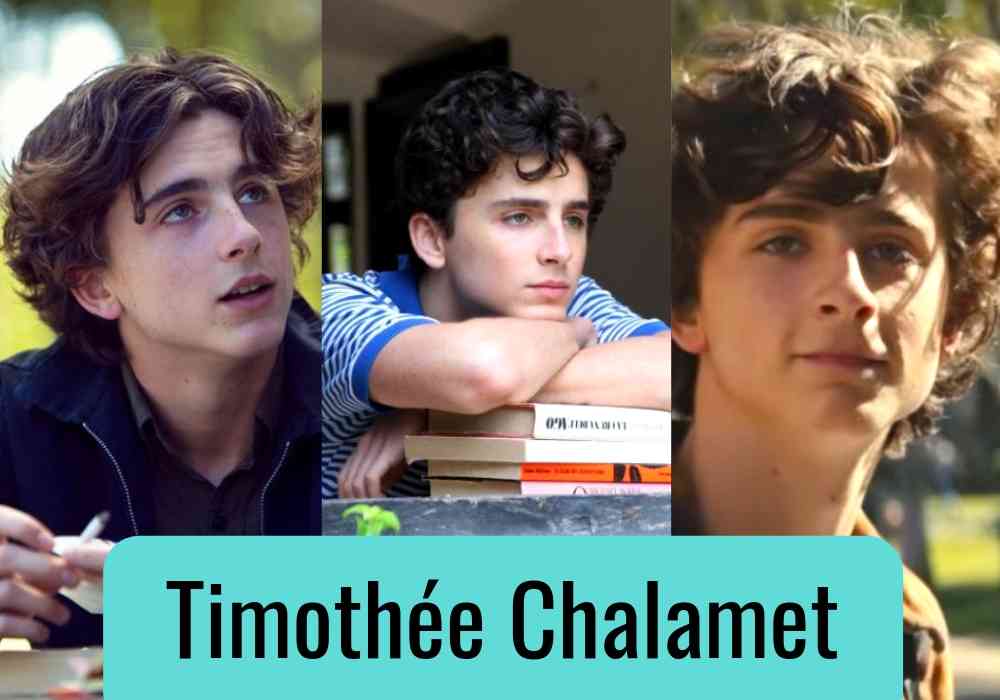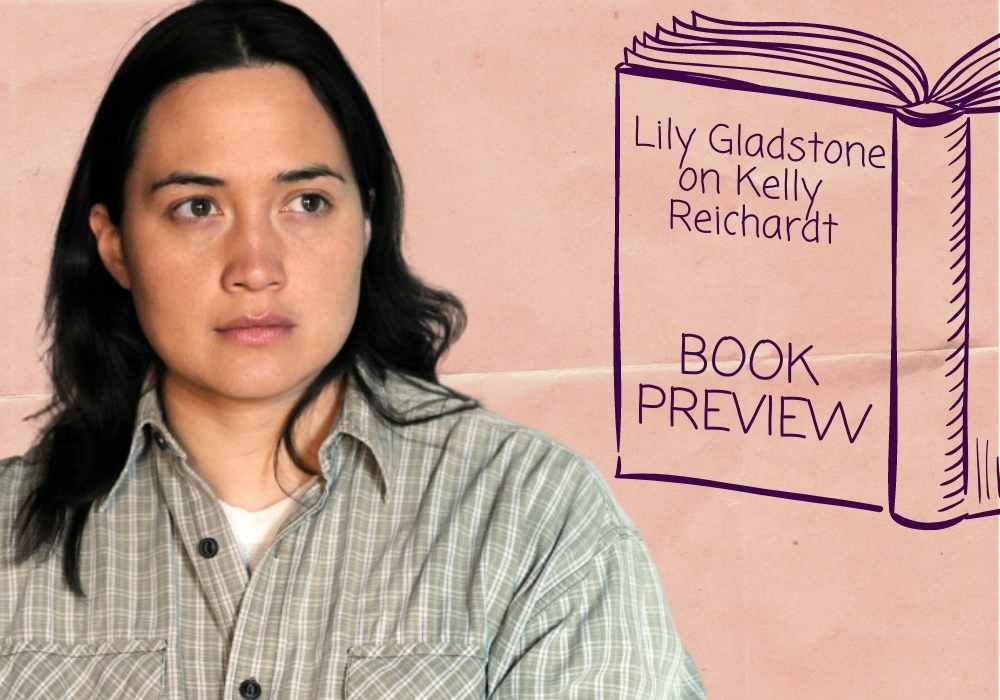Throughout her short but bright career, Florence Pugh (Lady Macbeth, Little Women, Midsommar) has made a mission of revealing the hidden vulnerability of outwardly strong women.
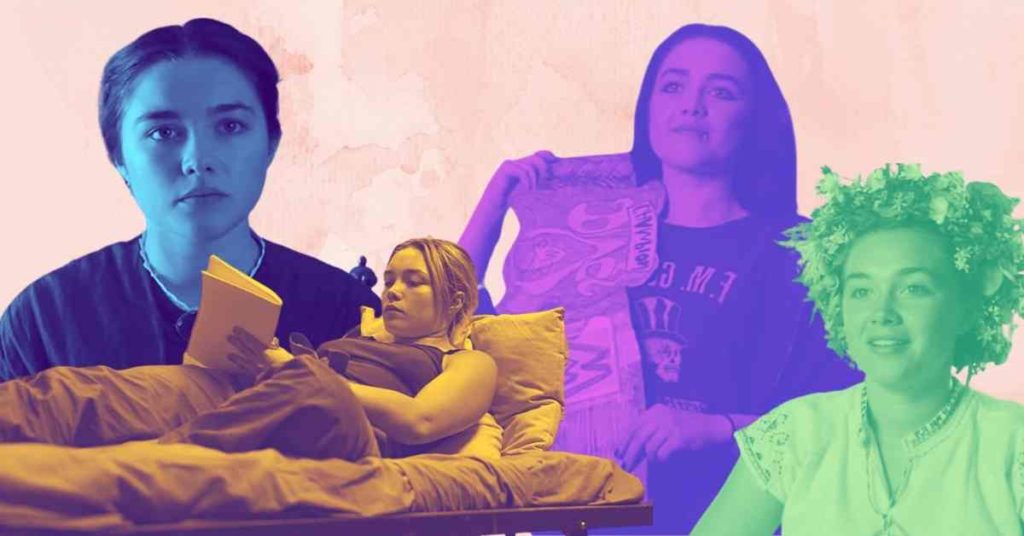
Discover one film you didn’t know you needed:
Not in the zeitgeist. Not pushed by streamers.
But still easy to find — and worth sitting with.
And a guide to help you do just that.
From the start of her career, Florence Pugh has played women who command any room they enter. Take her first screen role in Carol Morley’s The Falling, at just age 18. Pugh plays cool-girl Abbie, whose classmates stare at her like they’re in love, and whose death from a seizure causes an epidemic of fainting in the school. Her character dies 20 minutes into the film, but Pugh is so magnetic that her absence continues to be felt. Charisma can’t be taught, and Pugh has it in spades.
But Pugh’s brilliance is not just natural charisma — she skillfully explores characters who project strength, either to hide their flaws, mark their territory, or protect themselves emotionally. In Lady Macbeth, she’s a neglected Victorian bride who murders her new family to become head of the household; in Fighting With My Family, she’s a tough wrestler who rises to the top; in Little Women, she’s the petulant and selfish Amy who marries strategically to secure wealth and power. These women know what they want, and they’ll go to any lengths to get it.
It’s great fun watching the formidable Pugh stand her ground against adversarial forces, which often come in the form of patriarchal men. But it’s even more fascinating to observe the small details of her physical and vocal performance she includes that betray these women’s inner worlds, beyond their steely armour. Pugh reveals her characters’ vulnerabilities, like a secret she’s only letting us into, to encourage us to identify with these seemingly larger-than-life, or morally dubious, women.
Supporting roles
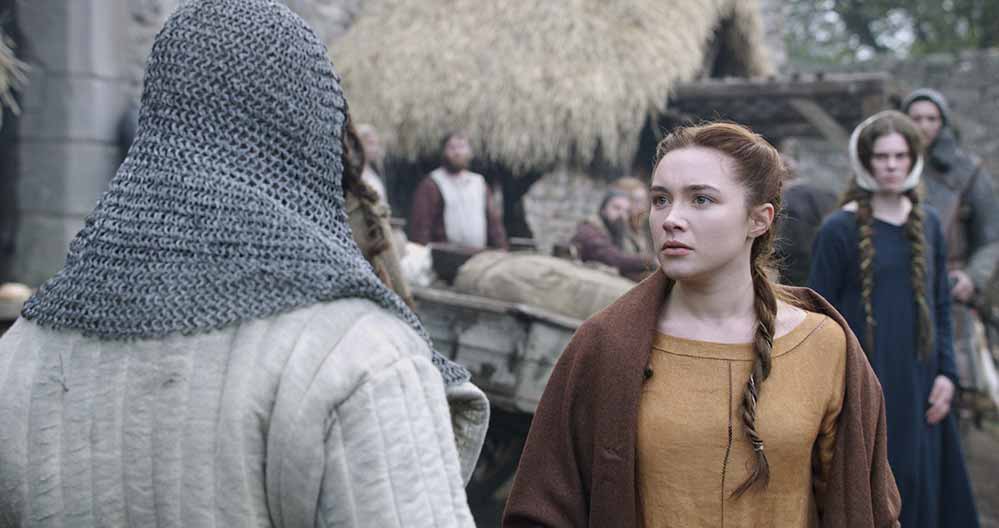
Florence Pugh’s supporting roles showcase an actress with such presence that she steals scenes even when she isn’t the story’s central focus. She’s so magnetic that the viewer is instantly drawn in by her, curious to know more. In both Outlaw King (David Mackenzie, 2018) and King Lear, (Richard Eyre, 2018) her body language in her first scene tells us more about her character than the words on the page.
In Outlaw King, Pugh plays Elizabeth de Burgh — the English wife of Scottish revolutionary Robert the Bruce — as a natural-born leader in a world (and a film) that won’t let her be one. Whatever space or room her Elizabeth is in, Pugh commands it. When Elizabeth is first introduced to her soon-to-be husband, she descends from her carriage and looks him directly in the eye, while he bows his head to the ground. She only briefly bows after a couple of beats, as if getting it out of the way out of courtesy, before returning to her pointed stare. Without hesitation or permission, Elizabeth begins to move around the courtyard of Robert’s castle, greeting the people of the village, almost as if she’s claiming the space as her own.
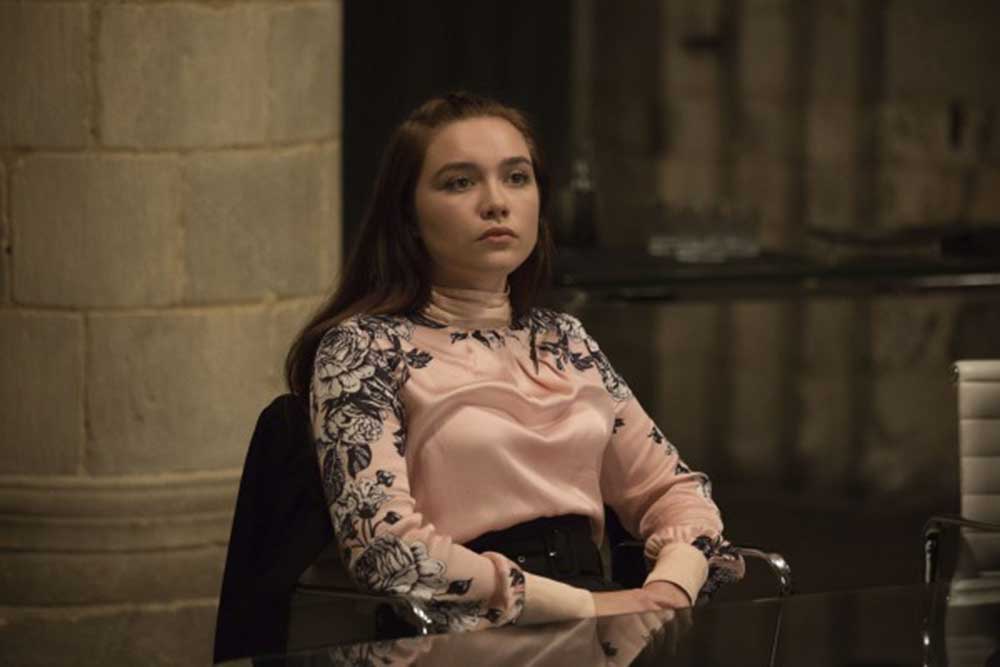
Her Cordelia in Richard Eyre’s King Lear is so striking that Pugh steals the opening scene from acting titans Anthony Hopkins, Emma Thompson, and Emily Watson — before she’s even uttered a word. As Thomson’s Goneril simpers to their father, we continually cut back to Pugh, as she rolls her eyes and raises her eyebrows at each one of Thompson’s lines. Before she gets to express it in words, Pugh lets us know that Cordelia has an opinion, and one so strong she’s struggling to keep it quiet. Her reaction shots become just as, if not more, interesting to watch than Thompson’s dialogue, which she’s reacting to.
Lady Macbeth (2017)
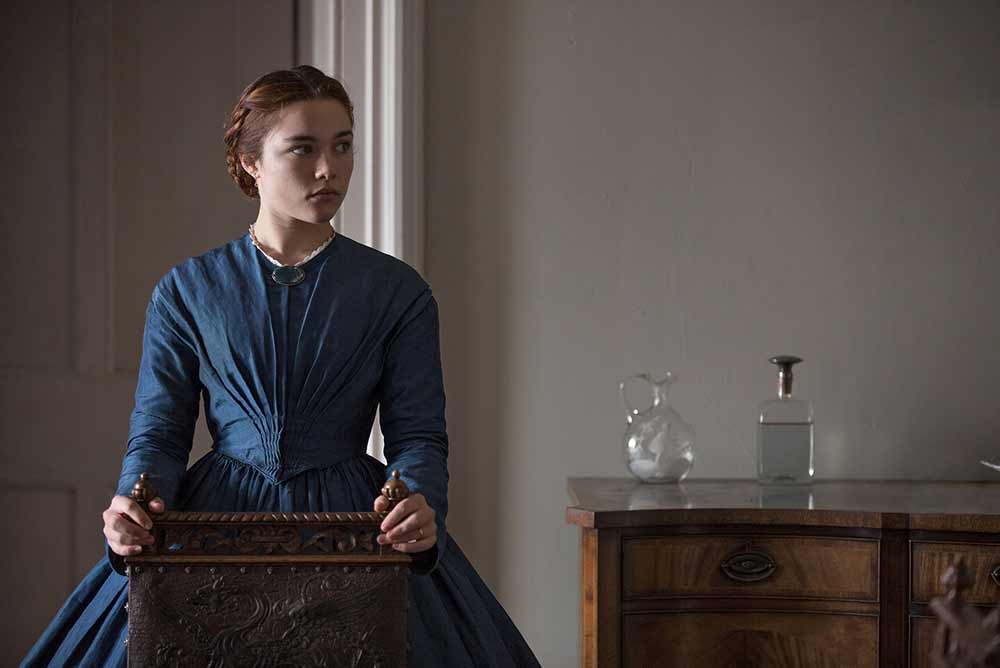
Even earlier in her career, Florence Pugh proved in her first lead role that, given more scope and screen time, she will plumb the depths of her characters to figure out what’s beneath their captivating surface. As sociopathic murderess Lady Katherine in William Oldroyd’s period thriller Lady Macbeth, Pugh goes above and beyond thin material; she humanises a character who does irredeemable things. As a woman slowly going mad under the strictures of patriarchy, Pugh maintains long periods of stillness. She keeps her face as a blank mask so as to keep Katherine an enigma; Katherine hides her emotions from those who might weaponise them against her. But the most fascinating parts of the film are when Pugh allows that mask to break, giving the audience momentary access to the very real woman beneath a cold visage.
Pugh’s most interesting work comes early in the film, in the transitory period before Katherine enters full sociopath mode, when Pugh reveals flashes of Katherine’s fear and humour. Take, for example, the way Pugh’s usually confident voice breaks and stutters on Katherine’s wedding night, when she asks her husband in vain for a meager bit of freedom. After Katherine drunkenly stumbles to dinner with her father-in-law, she bursts into a gleeful snort before reining herself back in — a brief glimpse of personality beyond her carefully curated self-presentation. It’s a shame that the film’s final act writes Katherine off as an emotionless, one note villain, because up until that point, Pugh had done such good work showing that she was more than that.
The Little Drummer Girl (2018)

The Little Drummer Girl (Park Chan-wook) allowed Pugh the entire length of a TV show to explore her character, Charlie; the show is so boring, but she’s so fascinating, that I found myself skipping past the bits she’s not in. Pugh portrays actress Charlie as persistently headstrong, only to reveal that her bullheadedness blinds her to her own flaws. Charlie is a seemingly aimless young woman whom we meet as part of a London theatre troupe, before a mysterious man whisks her away to Greece and recruits her as an undercover agent for a group of Israeli spies. She’s a woman who always follows her instincts until her instincts get her into deep trouble.
In one of Pugh’s first scenes — a conversation with friends about politics — her assured line delivery communicates Charlie’s strength in her own convictions, but the robotic, rehearsed tone of her speech also hints that her strength might be a false front. Charlie fights her corner without a hint of doubt and derides all opposing viewpoints, scoffing and frowning in incredulity at her sparring partner. But Pugh hints there’s something false behind Charlie’s gumption in the way she utters those stout lines. “I refuse to be a slave to patriarchy,” Charlie bluntly states later in the film, a bold statement Pugh delivers without a hint of genuine feeling.
Pugh shows Charlie’s intelligence in how she looks at everything with a critical eye. While Charlie’s peers greet a mysterious newcomer (Alexander Skarsgård) with jokes, Charlie is the only one who remains straight-faced, training her eyes directly on him and never letting up, questioning him with a demanding and severe tone of voice. But the seriousness, directness, and assuredness with which she addresses this man, as they get closer and closer and he eventually invites her to Athens with him, implies that Charlie thinks she’s got him figured out.
But Charlie is too sure of herself for her own good. She’s so sure of her conclusion — that he’s a playboy looking to show her a good time before dropping her for the next younger woman — that she’s willing to follow her instincts and join him on the impromptu trip, bored enough that she’ll distract herself with a brief love affair. Of course, she hasn’t got him figured out at all, which she learns when he takes her to a discreet location and an Israeli intelligence group corners her, attempting to recruit her for an undercover job. Each of Pugh’s actions and movements are so assured that we’re just as shocked as Charlie is when her instincts turn out to be wrong.
Fighting With My Family (2019)
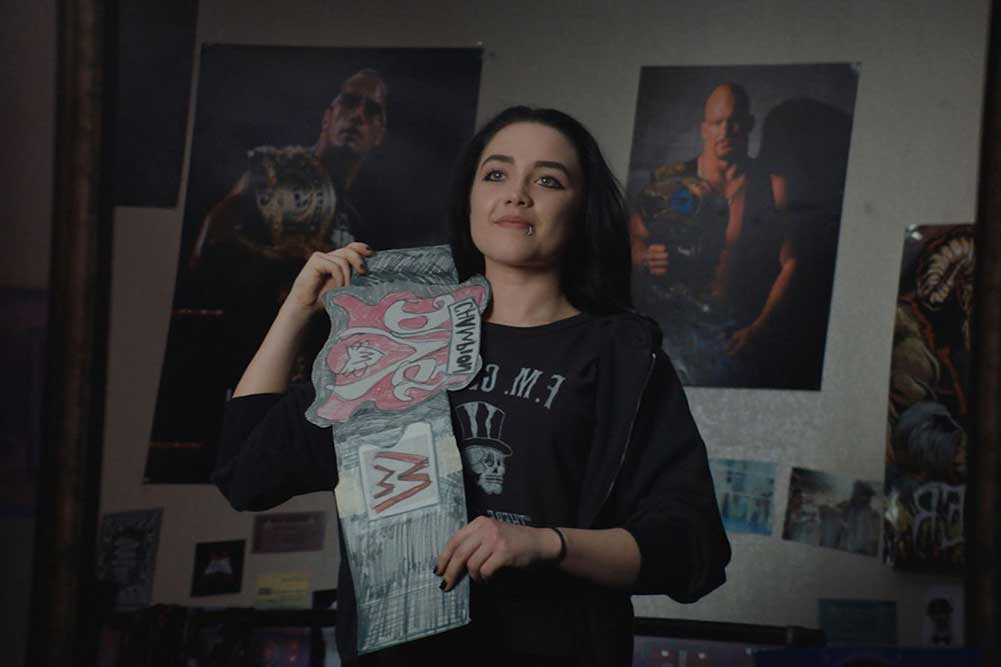
In Fighting With My Family, Florence Pugh’s Paige is strong in the most literal sense: she’s an aspiring wrestler who was thrown head first onto a path toward success. This underseen gem, directed and penned by comedian Stephen Merchant, follows the true story of wrestler Paige, who became an influential feminist icon in the WWE after she spearheaded the Women’s Wrestling Revolution. Despite her small stature, Pugh is a remarkable force in the role. The film is more about Paige’s beginnings as a local wrestler in Norwich and her rise to stardom than her eventual legacy. But it still seems perfect casting to put Pugh in the role of a trailblazer who refused to be beholden to the perceived limitations of her gender.
While Pugh embodies Paige’s determination, she also makes sure to remind us that, as with Charlie, her single-mindedness isn’t always healthy. At the WWE tryouts, Vince Vaughn’s coach character asks Paige why she wants to wrestle. “I’ve been wrestling since I was thirteen. My whole family wrestles,” Paige replies. Pugh delivers the line without a beat of hesitation, the words rolling off her tongue as if she’s practiced their exact intonation 100 times (Paige probably has). “But why do you want to wrestle?” Vaughn’s character retorts. He has to ask twice before she stops regurgitating the same response. Pugh falters; she takes a second to actually stop and think, before responding, “It’s an escape, isn’t it?” The difference between the two line deliveries — one assured but robotic, the other vulnerable and emotive — demonstrates that the bullish Paige hasn’t worked herself out yet, and being confronted with that catches her off guard.
Paige is so focused on getting what she wants that she becomes selfish: she looks down on the other women in her training group, feeding into the patriarchal mindset that she’s insistent on breaking down. She’s so convinced of her own ability to succeed that she derides her female peers, who are all blonde models with little previous wrestling experience. We’re fooled into going along with her thinking, too, because how could Florence Pugh ever be wrong? She’s so precise in everything that she does, so dynamic and charismatic and assertive, that it’s easy to uncritically nod along.
But when Paige’s tall, blonde peers confront her about her dismissive behaviour, pointing out that they’re trying their best to support their families back home, Pugh’s line delivery loses its vigour. She looks taken aback, confronted with how little Paige knows about the world and other people. All of a sudden, she shrinks into herself, curling up into a ball on the floor in a subsequent scene, her voice now flat and dejected. She only starts to regain her self-confidence when she makes a point of supporting the other women around her, which is when she regains her will to push herself physically in training, too.
Little Women (2019)
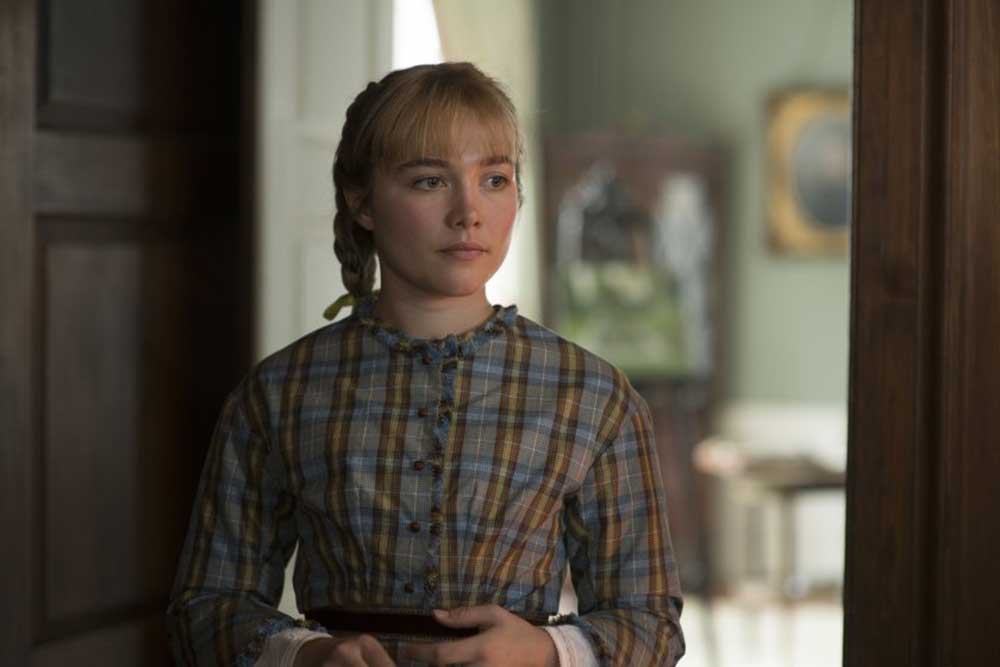
In Little Women, Florence Pugh gives perhaps her most impressive performance to date as Amy March, conveying the pomposity of the youngest and most universally hated of the March sisters, while lending her a complexity that other adaptations lacked. The performance earned Pugh her first Oscar nomination, for Best Supporting Actress, but she’s really a co-lead with Saoirse Ronan’s Jo — the two have almost equal screen time. In Gerwig’s adaptation, which skips back and forward in time, Pugh plays both 13-year-old Amy at home in Concord and 21-year-old Amy trying to make it as an artist in Paris. Pugh takes a character who has previously been labelled a whiny and annoying saboteur because she knows what she wants and isn’t afraid of going after it, and asks us to sympathise with her ambitions.
You can’t take your eyes off Pugh’s Amy; as a child, she’s a ball of energy and as a young woman her movements are practiced and majestic, like a dancer. Pugh uses very deliberate physical gestures to show us how the sophisticated lady-in-making older Amy is a product of all the practice and ambition of her unpolished younger self. Pugh grew up with a mother who was a dancer, on which Pugh commented, “It’s the one skill that I really love having had learned since I was younger, because every single film that I’ve ever done has needed movement in some way.”
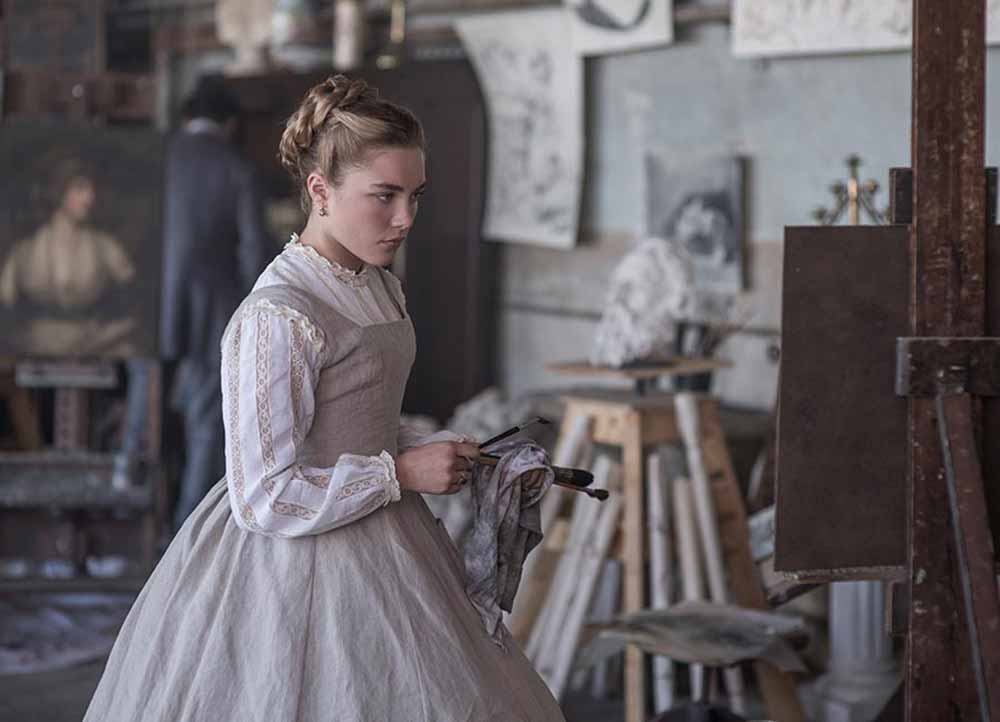
See how younger Amy, sometimes even just in the background of shots, twirls around her front room, raising her arms in an arc above her head. She’s practicing the moves of a lady, but she’s ungainly, not quite ready for that life. Her practice pays off: at a ball, older Amy twirls elegantly, her arms effortlessly forming the beautiful sweeping gestures that she worked toward as a child. Amy isn’t just the petulant youngest child who gets everything handed to her; she’s always known what she wants, and she worked hard at it for years until it became a reality.
Pugh plays older Amy as the picture of hard-earned composure, but she’s also careful to highlight Amy’s underlying humanity and insecurity. Take, for example, the scene which was used in all of Pugh’s award ceremony showreels, in which Amy monologues to Laurie: “I want to be great or nothing.” Here, Amy flaunts her intellect and shows how she’s planned her life out in a very practical way. Pugh’s balletic movement while delivering this speech reflects Amy’s lifetime of preparation: she glides around the room with the elegant gestures of a lady, packing her art supplies away as she talks, taking each task one at a time, her pace brisk but not hurried, indicating a kind of effortlessness. When she stops to look at Laurie, her words retain the same assured tone and pace. But we can tell she’s nervous about making herself vulnerable through how Pugh continually runs her hands through the cloth she’s holding. It’s a subconscious outlet for Amy’s nervousness that subtly disrupts her practiced perfection.
Midsommar (2019)
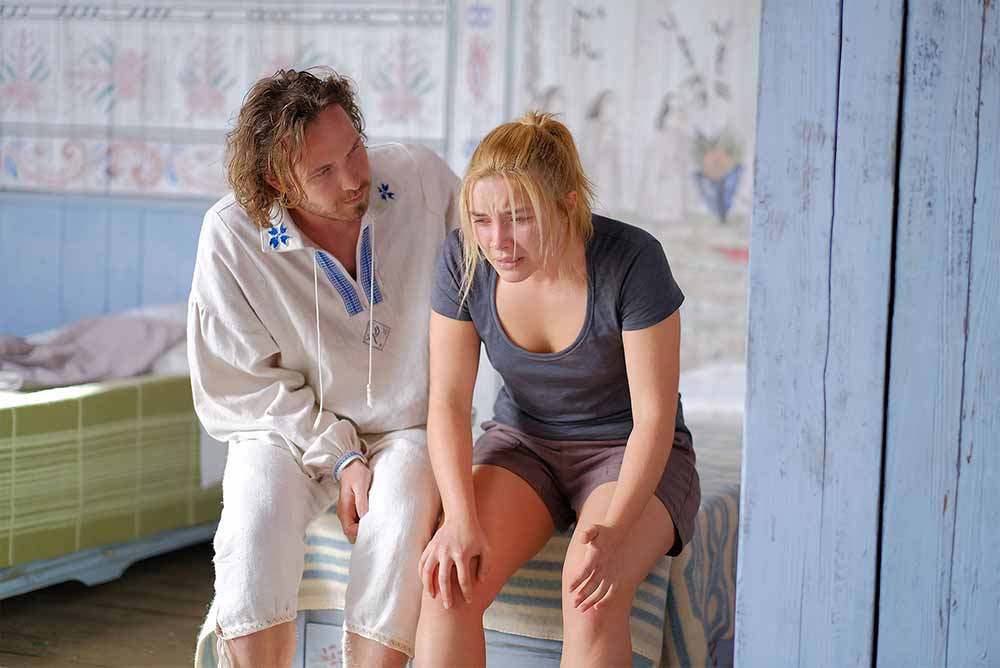
Midsommar is an outlier in Florence Pugh’s career that demonstrates her range, in the sense that her character, Dani, is a quiet, withdrawn woman rather than a charismatic trailblazer. At the same time, Midsommar feels like it was written to play exactly into her strengths. Dani is, like many Pugh characters, a woman who projects strength but possesses hidden vulnerability — in this case, grief over the death of her family. Fortunately, the film itself is also interested in this dichotomy. Dani tries to temper her emotions and pretend she’s OK so as not to burden her unsupportive boyfriend, Christian (Jack Reynor). But her anxiety and sadness is bursting at the seams, always in danger of showing. Over the course of the film, Dani learns to shed her armour and embrace her grief so she can start to heal (with the help of a murderous Swedish cult, of course).
In her first scene, Pugh establishes the scared young woman Dani is when she’s alone and not performing for anyone. Dani leaves a worried voicemail for Christian, and in one heartbreaking closeup, we witness Dani’s insecurities play out on Pugh’s face: lip-biting nervousness, voice-wavering uncertainty, constantly apologising for herself. While in Little Women, Pugh looked totally at home in grand ballroom gowns, here, she wears a baggy jumper and does everything she can to make herself small in it, keeping her arms hunched up inside the sleeves and grabbing onto the fabric like a comfort blanket. Her eyes are red with tears, and she nervously chews on her lip. We can see how upset she is, but she does everything she can to stop traces of emotion from seeping into her voice: she blinks back tears so that her sobs don’t get out of hand, she clenches her jaw to keep composure, and she fakes a light, airy tone when she tells him, “I’m very lucky to have you.”
Listen to our podcast on Midsommar
Very rarely in the film is Dani allowed to truly unleash her emotions, although when she does, Pugh uses the opportunity to demonstrate how loud the emotional torment of this quiet woman is. When Dani discovers that her sister did in fact kill herself, along with their parents, Pugh tackles the scene with all of her raw energy. Her screams rattle the bones, and her body rocks convulsively back and forth in Christian’s arms. After that moment, Pugh plays Dani as distant and emotionless, the “acceptable” image of a grieving woman, yet we know what’s hiding underneath, because we’ve seen her unravel. In fact, despite her calm, Pugh does constantly look like she’s on the verge of tears, as if one wrong word could crumble her.
In the Swedish commune, which is a hellscape for Dani’s peers but a land of opportunity for her, Pugh charts Dani’s progression from a closed off young woman to someone in touch with her own emotions. When Dani arrives at the commune, Pugh turns in on herself: she keeps her hands in her pockets and when she sits down she holds onto her knees as if in self-protection. She doesn’t have confidence in her own voice, so she purses her lips and frowns when she sees something she doesn’t like. She won’t allow herself to vent her sadness: in one scene, she tries to stall a breakdown by sitting alone in a field, closing her eyes, tensing her muscles, and wringing her hands, as if trying to push her feelings back down by screwing herself shut.
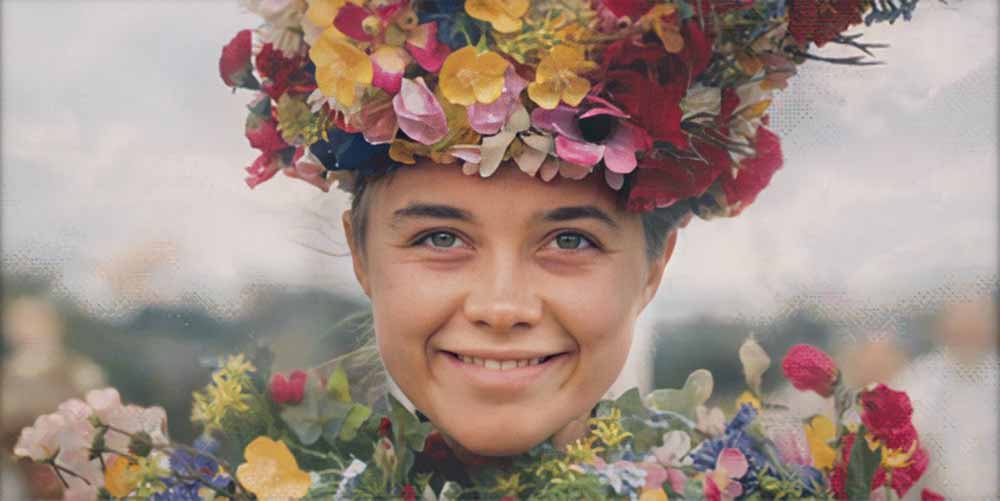
The more Dani becomes involved in group activities, the more she opens up. When she joins the women of the commune in dance, Pugh’s face transforms (as she spins and twirls in the blistering summer heat) from a worried frown to a genuine smile. It’s a big moment, because up until this point, she’s either looked distraught or completely neutral, with any smile feeling tight and forced.
In the film’s final scenes, Pugh plays Dani’s emergence from her chrysalis with such relish and conviction that her sobs and smiles have been immortalised in GIFs and memes across the internet. The second time in the film that Dani is allowed to totally unravel is the moment when she witnesses Christian have sex with another woman in a drug-fuelled orgy. Here, though, Pugh’s screams and her crumpled face are mimicked by the other women, who encourage her to express herself until eventually her horrified screams become louder and more full throated. They could easily be mistaken for ecstasy.
Pugh spends almost the entire rest of the film with red, tear-stained eyes — but she’s not crying anymore. She’s shed her fair share of tears. In the film’s now iconic final shot, Dani watches her ex-boyfriend and his friends die in a ritualistic fire, her head surrounded by a crown of flowers. At first, her eyes widen in a state of something like shock, or fear, or surprise. But then, her lips raise into a gleeful, uninhibited smile, far truer than most of her smiles in the film. There’s a reason why this final shot is so memorable and cathartic. Pugh carefully tracked Dani’s arc throughout the film, holding back and holding back, until that smile finally felt earned.
It feels like there’s no stopping Florence Pugh, now that she has an Oscar nomination, Hollywood directors knocking on her door, and a fanbase as big as any actress her age. She’s even shot a Marvel movie — Black Widow — so her bills are paid for quite some time (although thanks to COVID-19, that film has yet to see the light of day). It’s a precarious position for any young star to be in; will she continue to pick interesting roles and stretch her talents, or will she pick the most obvious or uninteresting of the surplus of scripts that are surely being sent her way? (I worried the same about Timothée Chalamet back in 2018, and I’m still worried). Her upcoming role in Olivia Wilde’s Don’t Worry Darling could go either way. I’m cautiously optimistic about Pugh’s future: if the roles I’ve detailed here prove anything, it’s that Pugh’s success is thanks to not just talent, but intelligence and curiosity.
You could be missing out on brilliant films starring cinema’s next great actors
Subscribe to the Seventh Row newsletter to stay in the know.
Subscribers to our FREE newsletter get an email every Friday which details some of the best new streaming options in Canada, the US, and the UK.
Click here to subscribe to the Seventh Row newsletter.
